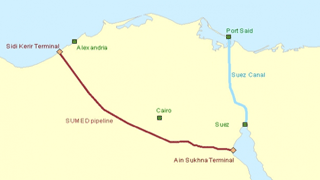Egypt Sumed Pipeline Yet to Accept Iran Oil after SanctionsSource: Bloomberg 3/3/2016, Location: Egypt |
|
|
|
|
 Egypt and Gulf Arab crude producers have yet to let Saudi Arabia’s regional rival Iran resume oil shipments through a pipeline they operate to supply customers in Europe and the Mediterranean Sea region, more than a month after international sanctions against Iran were lifted.
Arab Petroleum Pipelines Co., which operates the link known as SuMed, is still reviewing terms of the agreement that removed sanctions on Iran in January, according to a company official. The operator is seeking to ensure Iran complies with sanctions regulations before resuming oil shipments halted since August 2012, said the official, who asked not to be identified, citing company policy. Egyptian General Petroleum Corp. owns 50 percent of SuMed, which connects the Red Sea with the Mediterranean. State-run Saudi Arabian Oil Co., known as Aramco, owns 15 percent of the link; International Petroleum Investment Co. of the United Arab Emirates, 15 percent; three Kuwaiti companies, 15 percent; and Qatar Petroleum, 5 percent, according to SuMed’s official website. Iran is seeking to rebuild its energy industry after shedding sanctions that choked off growth and foreign investment. Last month the country loaded its first cargoes destined for European buyers since the removal of sanctions. Political friction between regional powerhouses Iran and Saudi Arabia, backed by its Gulf Arab allies, has intensified their battle for oil market share. Two Tankers One of those vessels, the Atlantas, a very large crude carrier chartered by Total SA of France, loaded at Iran’s Kharg Island last month and is rounding the Horn of Africa on its way to Europe, according to ship-tracking data compiled by Bloomberg. Another oil tanker, Distya Akula, has been anchored at the southern approach to the Suez Canal since Feb. 24 after loading at Kharg. SuMed provides an alternative transit route for oil cargoes from the Gulf region to the Mediterranean that are too large to be shipped through the Suez Canal. The tankers can use the SuMed pipeline to transfer some of their oil, thus lightening their loads for passage through the canal. Officials in the international marketing department of National Iranian Oil Co. weren’t available for comment on the pipeline after business hours in Tehran. Iran plans to increase its output by 1 million barrels a day this year. Daniel Yergin, vice chairman of energy consulting group IHS Inc., estimates the country will add 400,000 to 600,000 barrels a day, without specifying a date. “There is lots of talk about investment in Iran,” Yergin said Thursday at a conference in Abu Dhabi. “We think companies are going to be very cautious because of Iranian politics, and Iranian decision making.” For more information about related Opportunities and Key Players visit Egypt Oil and Gas Projects |
|
 |
|||||
|
Oil Egypt E-Marketplace - Subscription Packages - Benefits |
||
|